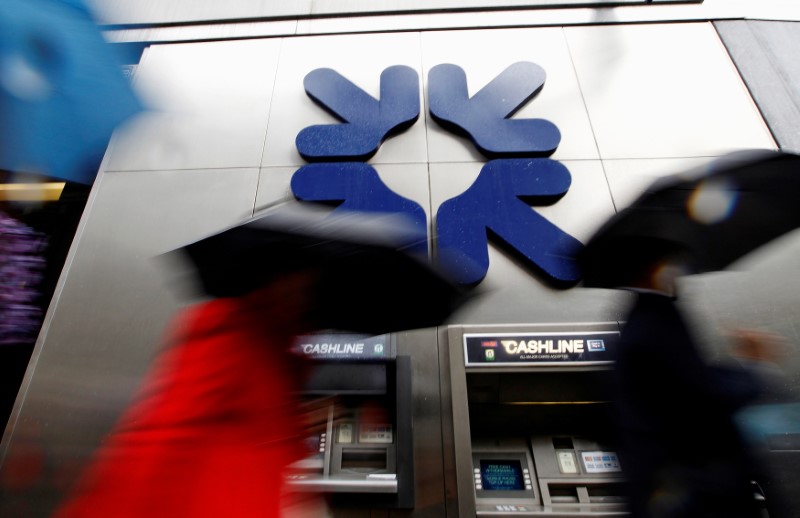By Emma Rumney, Lawrence White and Sinead Cruise
LONDON (Reuters) - Royal Bank of Scotland's (L:RBS) shares rose as much as 6 percent on Thursday after the bank reached a $4.9 billion settlement with U.S. authorities, opening the way for its privatization and return of cash to taxpayers who bailed it out in the financial crisis.
The fine, much lower than expected, resolves a U.S. Department of Justice investigation into the British bank's sale of mis-priced mortgage-backed securities in the run-up to the crisis and clears one of its most debilitating hangovers from that era.
"It's very humbling to have to announce a settlement of this magnitude," the bank's finance director Ewen Stevenson told reporters.
The agreement clears the way for RBS to restore its dividend and for the government to start selling down its more than 70 percent stake.
RBS executives said that it would take a few weeks to finish the paperwork, but the total penalty was unlikely to increase. Analysts had estimated a DOJ fine of up to $12 billion.
"The number is a firm number," Stevenson said.
RBS said it would be able to cover the bulk of the penalty out of existing provisions alongside a $1.44 billion charge it will take in the second quarter of this year.
"This marks a watershed for RBS – for as long as this investigation cast a pall over earnings and forecasts there was nowhere for investors to really go," said Neil Wilson, chief analyst for Markets.com.
CRISIS CASUALTY
The Department of Justice has previously settled with a whole list of banks including Citigroup (N:C), Deutsche Bank (DE:DBKGn), JPMorgan Chase (N:JPM), Credit Suisse (S:CSGN), Morgan Stanley (N:MS), Goldman Sachs (N:GS), Bank of America (N:BAC) and Barclays (L:BARC) for a total of more than $60 billion.
Bank of America paid the highest sum of $16.7 billion as part of an accord that also resolved claims by other federal agencies and several states. Barclays, which settled in March, had the smallest figure at $2 billion.
Once the world's largest bank by assets, RBS was one of the biggest casualties of the crisis which crippled credit, stock and housing markets and upended the global economy.
It narrowly avoided insolvency in 2008 after the government agreed a 45 billion pound ($61 billion) bailout, just six months after it had raised 12 billion pounds of cash from shareholders.
Chief Executive Ross McEwan's predecessor, Stephen Hester, who joined the bank following the bailout, said he had texted McEwan this morning to congratulate him and the team.
"That's the last really big milestone before the bank can be seen to be fully normalized," Hester, who is now CEO of RSA (L:RSA), said during a conference call on the insurer's results.
The fine had been a big obstacle to the government's plan, laid out in November, to begin reprivatising RBS before the end of the 2018-19 fiscal year - a much needed boost for finance minister Philip Hammond's coffers.
BACK TO DIVIDENDS
After ten years of restructuring, paying fines and shedding around 1.5 trillion pounds in assets, the DOJ settlement means RBS's last large legacy issue is out of the way. It had already paid just over $7 billion in other settlements with various U.S. authorities.
McEwan also said the bank would now discuss with regulators paying RBS's first dividend in a decade, leaving open the possibility the bank could start returning years' worth of surplus capital to shareholders before its next annual results.
"The fact they can begin to think about how to return that to shareholders is a major and long-awaited change," said Olivia Treharne, a fund manager at Legal & General Investment Management, RBS's number 10 shareholder according to Thomson Reuters data.
One of the bank's largest 20 investors said shareholders should be cautious about the prospects of getting their hands on the bank's excess capital just yet.
"This is hardly a Silicon Valley company. I'd like to see much of that plowed into the bank's IT systems," said the investor, who asked not to be named.
McEwan had hoped for a settlement before the end of 2017, but changes at the DOJ following the inauguration of U.S. President Donald Trump saw negotiations slip back.
RBS may have benefited from settling under Trump's administration, which has been softer on banks than that of his predecessor Barack Obama.
RBS executives said one reason for the settlement being below estimates was that RBS did not have to pay out billions of dollars in consumer relief, a staple of such settlements under the Obama administration.

($1 = 0.7372 pounds)